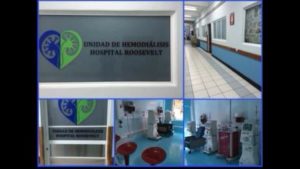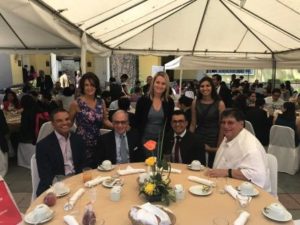
Unidentified Sugarcane Worker; photo credit PRESIDENCIA, Republica Oriental del Uruguay
A group from Washington University involved in a collaborative effort to combat an epidemic of chronic kidney disease in Latin America recently returned from scientific conferences in Guatemala City, Guatemala.
MesoAmerican Nephropathy (MeN) is an unexplained epidemic of CKD prevalent on the Pacific coast of Latin American, particularly Guatemala, Nicaragua, El Salvador and Costa Rica. MeN was first described in published literature only 14 years ago. The disease mainly affects young and middle-aged male laborers working in agriculture, specifically in the sugarcane fields, and in other occupations that involve strenuous work and heat stress. The epidemic has killed at least 20,000 men in this region, at least 2,500 per year. The exact cause, disease mechanisms and associated pathophysiology of MeN are not fully understood.
In 2013, the Pan-American Health Organization (PAHO) declared that CKD of unknown origin was a significant health problem in the region and made a commitment to strengthen scientific research of the disease.
The Guatemala CKD MesoAmerican Nephropathy project resulted from the mentorship of Marcos Rothstein, MD, Professor of Medicine, Division of Nephrology, with Internal Medicine resident Dr. Timothy Laux, through the Mentors in Medicine program. A group of Washington University researchers, residents, fellows and staff partnered with the Guatemala Social Security Institute (IGSS) hospital system and Roosevelt Hospital in Guatemala City to work together towards improving patient outcomes and understanding this disease. The International Society of Nephrology (ISN) has officially recognized the centers of nephrology at WU and IGSS as a Sister Renal Center Pair.

Hospital Roosevelt, Guatemala City, Guatemala
The goals of the collaborative effort are to train and educate clinical staff, upgrade clinical services, perform clinical research, promote community orientation and spread knowledge through publication. This partnership is led by Dr. Rothstein at WU and Vicente Sanchez Polo, MD, from the Division of Nephrology at IGSS.
To date, two fellows from IGSS have rotated at WU in the Division of Nephrology and the outpatient Vascular Access Center, which is headed by Steven Bander, MD, and is part of the St. Luke’s Hospital system in St. Louis. The fellows (Drs. Ever Cipriano Maldonado and Erick Herrera) received advanced training in hemodialysis, vascular access, and clinical nephrology.
The W U group just returned from Guatemala after participating in academic congresses for Hospital Roosevelt (the largest public hospital in Guatemala) and IGSS. The symposiums focused on nephrology/CKD and capacity building and training. Dr. Ever Cipriano Maldonado discussed how the quality of medical education has improved due to the mentorship of WU and the Vascular Access Center. Discussions included development of community outreach programs with the nephrology fellowship of IGSS to encourage young trainees to become part of the community and educate citizens about chronic kidney disease and prevention. Dr. Sanchez Polo proudly announced that more young physicians are becoming interested in the MeN program; three physicians have just joined the program. The next renal fellow trainee is scheduled to arrive at WU in the first quarter of 2017.
U group just returned from Guatemala after participating in academic congresses for Hospital Roosevelt (the largest public hospital in Guatemala) and IGSS. The symposiums focused on nephrology/CKD and capacity building and training. Dr. Ever Cipriano Maldonado discussed how the quality of medical education has improved due to the mentorship of WU and the Vascular Access Center. Discussions included development of community outreach programs with the nephrology fellowship of IGSS to encourage young trainees to become part of the community and educate citizens about chronic kidney disease and prevention. Dr. Sanchez Polo proudly announced that more young physicians are becoming interested in the MeN program; three physicians have just joined the program. The next renal fellow trainee is scheduled to arrive at WU in the first quarter of 2017.
Basia Najarro, Business Director, Division of Medical Education in the Department of Internal Medicine at WU, is the project manager for this initiative and works closely with the WU and Guatemalan team to “keep the wheels well oiled”. Najarro also works closely with BJC to acquire donations of much-needed medical equipment. “We are extremely thankful to BJC for this opportunity as the medical equipment and supplies are necessary to continue with the mission of providing excellence in patient care, education and research,” she says.
The collaborative exchange between both parties is essential to the success of the training program. Pooja Koolwal, MD, a first-year WU nephrology fellow, spent a month at Roosevelt Hospital involved in a renal research project during the senior year of her residency here. “My rotation in Guatemala provided me a glimpse into the lives of dialysis patients as I witnessed their daily struggles with the psychological and economic burdens of their treatments,” says Dr. Koolwal, who is now leading research efforts at WU and collaborating with fellows at IGSS.
Joaquin Barnoya, MD, MPH, Associate Professor of Surgery, Division of Public Health Sciences, School of Medicine, plays an instrumental part in the Guatemalan/WU initiative. Dr. Barnoya mentors the Division of Medical Education residents who have developed an interest in nephrology, some who have gone on to become nephrology fellows, such as Dr. Koolwal. Dr. Barnoya’s main research interest is chronic disease prevention both here and in his homeland of Guatemala. “In an under-resourced and -staffed healthcare system, like the one in Guatemala, MeN is yet another threat to this vulnerable system,” says Dr. Barnoya. “We therefore need to identify the most appropriate strategy to prevent, diagnose, and treat kidney disease in Guatemala.”
Although much is still unknown about MeN, progress has been made. Dr. Rothstein states that there is better understanding of the pathology of the disease because of an increased number of kidney biopsy studies. “It is also more clear that chronic dehydration/volume depletion and loss of electrolytes such as potassium play a key role in the vicious cycle of the disease,” he says.
The team’s most recent publication is: Prevalence of chronic kidney disease of non-traditional causes in patients on hemodialysis in southwest Guatemala; Laux TS, Barnoya J, Cipriano E, Herrera E, Lopez N, Sanchez Polo V, Rothstein M:. PAHO 39(4), 2016. Click here to read full article.
More on the history of the MeN project can be found in previous Division of Nephrology news posts: 7/29/14, 8/5/15, 10/12/15, 1/16/16.